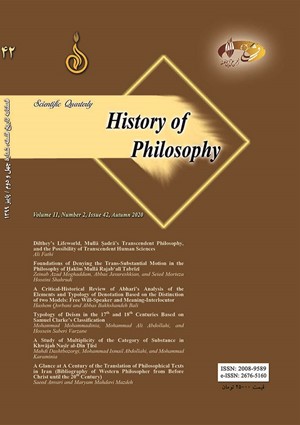A Study of Multiplicity of the Category of Substance in Khwājah Naṣīr al-Dīn Ṭūsī
Subject Areas : Etymology of philosophical termsMahdi Dasht Bozorgi 1 , Mohammad Ismail Abdollahi 2 , Mohammad Karaminia 3
1 - Assistant Professor, Religions and Philosophy Department, University of Kashan, Kashan, Iran
2 - Faculty member at the Religions and Sects Department, Qom Seminary, University of Religious and Denominations, Qom, Iran
3 - PhD candidate of Imamiyyah Kalam, The University of Quran and Hadith, Qom, Iran
Keywords: Contradiction substance Khwājah Naṣīr al-Dīn Ṭūsī Asās al-iqtibās Tajrīd al-i‘tiqād ,
Abstract :
Khwājah Naṣīr al-Dīn Ṭūsī has sometimes provided two different views regarding a scientific problem, one following the method of the people of kalam and the other following the method of philosophers. At first sight, one might assume that Ṭūsī is making contradictory comments; however, an analysis of his discussions reveal that such contradictions are only superficial and can be explained justifiably within the framework of his general system of philosophy. One of such contradictory cases pertains to the category of substance. In his works on logic, similar to Peripatetic philosophers, Ṭūsī considers substance to be a category or genus of genera; however, he deemed of substance as a secondary intelligible in his Tajrīd al-i‘tiqād. The present paper aims to clarify this view of the multiplicity of the category of substance. Then, in order to judge its legitimacy, the authors pose some possibilities and finally introduce one of the views which seems to be compatible with reality as their own standpoint. Through referring to Ṭūsī’s words and considering his social and academic position during his time, when philosophers were under huge attacks by mutikallimun, as well as given his moderate, truth-loving, and academic character, the authors demonstrate that this contradiction is superficial rather than real. Following the library method, this research was conducted based on a thorough study of Ṭūsī’s works. Nevertheless, the researchers also took the views of his commentators into consideration when necessary.
حسنزاده آملی، حسن (1433ق) تعلیقه علی کشف المراد، قم: موسسة نشر اسلامی.
حسنی، سیدحسین (1372) بررسی و داوری در مسائل اختلافی میان دو فیلسوف اسلامی؛ خواجه نصیر و فخر رازی، تهران: دانشگاه تهران.
حلی، حسن بن یوسف (1363) الجوهر النضید فی شرح منطق التجرید، قم: بیدار.
حلی، حسن بن یوسف (1413ق) کشف المراد فی شرح تجرید الإعتقاد، تصحیح حسن حسنزاده آملی، قم: مؤسسة نشر اسلامی.
سبزواری، ملاهادی (1413ق) شرح منظومه، تصحیح و تعلیق حسن حسنزاده آملی، تهران: نشر ناب.
سهروردی، شهابالدین یحیی بن حبش (1372) مجموعه مصنفات شیخ اشراق، تهران: مؤسسه مطالعات و تحقیقات فرهنگی.
طباطبایی، سیدمحمدحسین (1390) بدایة الحکمة، تحقیق عباسعلی زارعی سبزواری، قم: مؤسسۀ آموزشی و پژوهشی امام خمینی.
طوسى، نصیرالدین محمد (1335) مجموعه رسائل، به اهتمام محمدتقی مدرس¬رضوی، تهران: دانشگاه تهران.
طوسى، نصیرالدین محمد (1367) اساس الإقتباس، تصحیح محمدتقی مدرس رضوی، تهران: دانشگاه تهران.
طوسى، نصیرالدین محمد (1425ق) شرح اشارات و التنبیهات، تحقیق حسن حسنزاده آملی، قم: بوستان كتاب.
قمی، شیخ عباس (بی¬تا) الکنی و الألقاب، تهران: مکتبة الصدر.
قوشچی، علاءالدین علی بن محمد (1382) شرح تجرید العقائد، تهران: میراث مکتوب.
کرمی¬نیا، محمد (1399) تبیین تعارض یا عدم تعارض در آراء فلسفی و کلامی خواجه نصیرالدین طوسی، پایاننامه کارشناسی ارشد براهنمایی دکتر مهدی دشتبزرگی، دانشگاه کاشان.
لاهیجی، عبدالرزاق (1425ق) شوارق الالهام فی شرح تجرید الکلام، تحقیق اکبر اسدعلیزاده و مقدمه جعفر سبحانی، قم: مؤسسة امام صادق(ع).
مدرس رضوی، محمدتقی (1386) احوال و آثار خواجه نصیرالدین طوسی، تهران: اساطیر.
ملاصدرا، محمد بن ابراهیم (1368) الحكمة المتعالیة فى الأسفار الأربعة، قم: مصطفوی.


